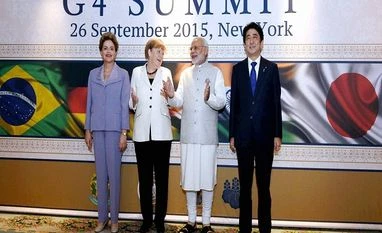Demanding comprehensive reform of the UN Security Council, the G4 nations of Brazil, Germany, India and Japan today asserted that they are legitimate candidates for permanent membership in the top UN body on account of the "geopolitical realities" of the 21st century.
Minister of State for External Affairs M J Akbar, Federal Foreign Minister of Germany Frank-Walter Steinmeier, Foreign Minister of Brazil Jose Serra and Foreign Minister of Japan Fumio Kishida met at the G4 meeting here yesterday on the sidelines of the UN General Assembly session.
"The G4 ministers underscored their unwavering commitment to a comprehensive reform of the Security Council which needs to take into account the geopolitical realities of the 21st century," a joint press statement said.
"They emphasised that the G4 countries are legitimate candidates for permanent membership and supported each other's aspirations," it said, adding that the ministers discussed their expectations for the next Secretary General of the United Nations.
It said more than 70 years after the founding of the UN, the Security Council has to adapt in order to cope with the ever growing global challenges.
"With a view to the manifold conflicts and humanitarian crises, a more representative, legitimate and effective Council is needed more than ever to guarantee peace and security worldwide," it said, adding that the G4 nations called upon all reform-oriented member states to join efforts and finally bring about meaningful reform.
The ministers added that substantial progress to achieve UNSC reform was still limited and efforts need to be intensified to build further momentum and to arrive at real text-based negotiations.
They pledged to continue to work towards a comprehensive Security Council reform in the framework of the Inter- Governmental Negotiations.
The Ministers also expressed their support for equitable regional representation, underscoring the need for Africa's representation in both the permanent and non-permanent membership as well as adequate and continuing representation of small and medium sized Member States, including the Small Island Developing States, in a reformed Security Council.
At present, the Security Council has five permanent members: China, France, Russian Federation, the UK, and the US, and ten non-permanent members elected for two-year terms by the General Assembly.
Minister of State for External Affairs M J Akbar, Federal Foreign Minister of Germany Frank-Walter Steinmeier, Foreign Minister of Brazil Jose Serra and Foreign Minister of Japan Fumio Kishida met at the G4 meeting here yesterday on the sidelines of the UN General Assembly session.
"The G4 ministers underscored their unwavering commitment to a comprehensive reform of the Security Council which needs to take into account the geopolitical realities of the 21st century," a joint press statement said.
Also Read
It said more than 70 years after the founding of the UN, the Security Council has to adapt in order to cope with the ever growing global challenges.
"With a view to the manifold conflicts and humanitarian crises, a more representative, legitimate and effective Council is needed more than ever to guarantee peace and security worldwide," it said, adding that the G4 nations called upon all reform-oriented member states to join efforts and finally bring about meaningful reform.
The ministers added that substantial progress to achieve UNSC reform was still limited and efforts need to be intensified to build further momentum and to arrive at real text-based negotiations.
They pledged to continue to work towards a comprehensive Security Council reform in the framework of the Inter- Governmental Negotiations.
The Ministers also expressed their support for equitable regional representation, underscoring the need for Africa's representation in both the permanent and non-permanent membership as well as adequate and continuing representation of small and medium sized Member States, including the Small Island Developing States, in a reformed Security Council.
At present, the Security Council has five permanent members: China, France, Russian Federation, the UK, and the US, and ten non-permanent members elected for two-year terms by the General Assembly.
)